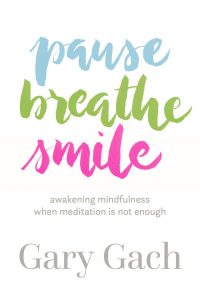Thich Nhat Hanh’s Code of Global Ethics
Editor’s note | At the turning of the Millennium, the United Nations chose Thich Nhat Hanh’s code of global ethics, the Five Mindfulness Trainings, as the foundation for a non-sectarian ethical path for humanity. Along with several Nobel Peace Prize laureates, he helped to create Unesco’s Manifesto 2000 which includes the sprit of the five trainings and has been signed by 75-million people.
Pause, Breathe, Smile
the golden rule
We’re ethically motivated when our intentions are based on conscious values. But where do our values come from? Often, we learn our values through role models, our family, our ancestry, and society. I can also explore values in daily interactions, such as when someone asks me questions about myself. I listen deeply, as what people choose to ask reflects what they value.
Actually, many sets of ethical guidelines might all be boiled down to one: The Golden Rule. From Christianity to Islam, from Baha’i to Zoroastrianism, and from indigenous spirituality to humanist existentialism, this is like a golden thread running through civilizations, like a single figure in a complex carpet interwoven by the diverse cultures on our blue planet.
The Golden Rule is a tenet that advises us to treat others as we would want them to treat us. Its nondual wisdom of seeing others as not different from ourselves clears our view. And it’s an agreement: we are all in this together. This reintroduces us to our relationality. Our personal experiences of it will vary, of course. For instance, anyone routinely mistreated could have more experiential insight into it than me. Yet the value of the Golden Rule doesn’t vary. It’s one truth, with multiple applications. Its value becomes bankable when we realize that it begins with us. Setting intention from such an active, awakened perspective surely results in our becoming better people.
To identify with other beings as closely as you do yourself . . . world peace, as simple as that.
mindfulness trainings
With vigorous motivation as a base and the Golden Rule as our pole star, we look for training. How can we clarify and apply our intentions in daily life? Fortunately, we inherit classic precedents. For example, all three Abrahamic religions teach ten primary precepts.* We might boil these down into five themes:
1 Reverence for life
2 Generosity
3 Love
4 Communication
5 Sobriety
Some mindfulness practitioners review these every morning, perhaps from a sheet of paper by the bathroom mirror that might read something like this:
On behalf of myself and all beings, I intend to refrain from consciously hurting anyone.
I intend to refrain from overtly or covertly taking what is not mine.
I intend to abstain from sexuality that is exploitive or abusive.
I intend to be sure that my speech is kind as well as true.
I intend to refrain from addictive behaviors that confuse my mind and lead to heedlessness.
Such mindfulness trainings outline a gold standard against which we can measure truth, and our responsibility to it, for regular review. I’d like to share a version as envisioned and revisioned over the years by Thich Nhat Hanh and the Plum Village community. They’re invaluable for studying, observing, and realizing our aspirations to become warm, trustworthy, authentic human beings, for ourselves and others. I consider them as my universal survival kit. As you’ll see, they’re quite contemporary. They serve as sturdy, dynamic, daily points of departure for awakening mindfulness.
My weekly circle reads and discusses them every full moon. Thousands of mindfulness practitioners engage them regularly. Please offer them your serene mind, your open heart, and a reflective ear, open to what resonates within.
The Five Mindfulness Trainings of Thich Nhat Hanh
THE FIRST MINDFULNESS TRAINING Reverence for Life
Aware of the suffering caused by the destruction of life, I am committed to cultivating the insight of interbeing and compassion and learning ways to protect the lives of people, animals, plants, and minerals. I am determined not to kill, not to let others kill, and not to support any act of killing in the world, in my thinking, or in my way of life. Seeing that harmful actions arise from anger, fear, greed, and intolerance, which in turn come from dualistic and discriminative thinking, I will cultivate openness, nondiscrimination, and nonattachment to views in order to transform violence, fanaticism, and dogmatism in myself and in the world.
THE SECOND MINDFULNESS TRAINING True Happiness
Aware of the suffering caused by exploitation, social injustice, stealing, and oppression, I am committed to practicing generosity in my thinking, speaking, and acting. I am determined not to steal and not to possess anything that should belong to others, and I will share my time, energy, and material resources with those who are in need. I will practice looking deeply to see that the happiness and suffering of others are not separate from my own happiness and suffering; that true happiness is not possible without understanding and compassion; and that running after wealth, fame, power, and sensual pleasures can bring much suffering and despair. I am aware that happiness depends on my mental attitude and not on external conditions, and that I can live happily in the present moment simply by remembering that I already have more than enough conditions to be happy. I am committed to practicing Right Livelihood so that I can help reduce the suffering of living beings on Earth and reverse the process of global warming.
THE THIRD MINDFULNESS TRAINING True Love
Aware of the suffering caused by sexual misconduct, I am committed to cultivating responsibility and learning ways to protect the safety and integrity of individuals, couples, families, and society. Knowing that sexual desire is not love, and that sexual activity motivated by craving always harms myself as well as others, I am determined not to engage in sexual relations without true love and a deep, long-term commitment made known to my family and friends. I will do everything in my power to protect children from sexual abuse and to prevent couples and families from being broken by sexual misconduct. Seeing that body and mind are one, I am committed to learning appropriate ways to take care of my sexual energy and cultivating lovingkindness, compassion, joy, and inclusiveness — which are the four basic elements of true love —
for my greater happiness and the greater happiness of others. Practicing true love, we know that we will continue beautifully into the future.
THE FOURTH MINDFULNESS TRAINING Loving Speech and Deep Listening
Aware of the suffering caused by unmindful speech and the inability to listen to others, I am committed to cultivating loving speech and compassionate listening in order to relieve suffering and to promote reconciliation and peace in myself and among other people, ethnic and religious groups, and nations. Knowing that words can create happiness or suffering, I am committed to speaking truthfully using words that inspire confidence, joy, and hope. When anger is manifesting in me, I am determined not to speak. I will practice mindful breathing and walking in order to recognize and to look deeply into my anger. I know that the roots of anger can be found in my wrong perceptions and lack of understanding of the suffering in myself and in the other person. I will speak and listen in a way that can help myself and the other person to transform suffering and see the way out of difficult situations. I am determined not to spread news that I do not know to be certain and not to utter words that can cause division or discord. I will practice Right Diligence to nourish my capacity for understanding, love, joy, and inclusiveness and gradually transform the anger, violence, and fear that lie deep in my consciousness.
THE FIFTH MINDFULNESS TRAINING Nourishment and Healing
Aware of the suffering caused by unmindful consumption, I am committed to cultivating good health, both physical and mental, for myself, my family, and my society by practicing mindful eating, drinking, and consuming. I will practice looking deeply into how I consume the Four Kinds of Nutriments, namely edible foods, sense impressions, volition, and consciousness. I am determined not to gamble, or to use alcohol, drugs, or any other products that contain toxins, such as certain websites, electronic games, TV programs, films, magazines, books, and conversations. I will practice coming back to the present moment to be in touch with the refreshing, healing, and nourishing elements in me and around me, not letting regrets and sorrow drag me back into the past nor letting anxieties, fear, or craving pull me out of the present moment. I am determined not to try to cover up loneliness, anxiety, or other suffering by losing myself in consumption. I will contemplate interbeing and consume in a way that preserves peace, joy, and well-being in my body and consciousness, and in the collective body and consciousness of my family, my society, and the Earth.
trainings for a creative, fulfilling, beneficial lifestyle
Mindfulness trainings are voluntary, pragmatic, and relational. They resonate harmoniously with equivalents found in a range of spiritual traditions. Yet they’re bottom-up, rather than top-down. Lived experience rather than dogma or decree is their standard. They’re not motivated by punishment or reward but by self-improvement.
Each training is titled with a primary virtue, an aspiration for the best within each of us. Then each begins in recognizing how suffering is always present from the get-go, implicitly, to be understood and transformed. Each also points us toward what’s beneficial and steers us away from what’s harmful. In reality, wholesome and unwholesome are marbled together. So there’s healthy wisdom in maintaining a nondual perspective that sees how one implies the other, as two sides of the same coin.
Of course, situations are not always clear-cut. We may not always know what to do. Still, we have models to draw upon. We can apply our natural goodness as recognized in previous situations to current similar situations by extension. What’s useful in a traffic jam (patience, for instance) may also apply at an office meeting. This process implies ethics can be a lifestyle of continual creative discovery.
look around
Mindfulness isn’t necessarily about awakening within our interior life only. Otherwise it might be considered merely navel-gazing. Awakening wisdom teaches me how my exterior and interior life are not separate. What happens in the world is happening within me, and vice versa. A committed, engaged practice of mindfulness invites me to observe and work with the imbalances implicit in social relations. Social conditions often require proper study for skillful observation and practice to take place. Independent scholar Ed Ng has deftly articulated some of these conditions as “personal exposure to vulnerability, uneven material conditions, power relations, and my position in all of it.” Mindfulness practice provides a safe space of refuge in which I can awaken, and stay woke, to such themes in my lived world.
And mindfulness shows me how hope need not be just an emotion or belief, but a conscious course of action, for confirmation. Without such hope, I don’t know how I would survive.
a path with a heart
Awakening mindfulness takes courage. And in the root of the word courage we can hear the French word for heart: coeur. So mindfulness trainings encourage us to listen fearlessly to our heart. In setting intention, I ground myself in my breathing to be in touch with my body’s heart, where I feel my intentions usually connect from; my actions tend to connect from my physical center, below my navel. Awareness of vital body centers leads me away from the concept that everything’s happening in my cranium.
Sincere and truthful, heartful and wise, mindfulness trainings open us to healing and transformation, for ourselves and our relations. For instance, the trainings encourage us to notice where we hurt. Too often we flinch and look away from our suffering or hide it under a bandage or medicate it or fill it up with stuff. Easy ways out. They’re the status quo of a mass culture of entertainment, which discounts true virtue and preys instead on greed and fear, cynicism and despair. Yet it’s our soft spots of vulnerability that reveal to us our heart, our core capacity for true goodness. If we don’t resist confronting our hurts but recognize and even contend with them, here’s where we “build our humanity and keep it alive,” as author Maxine Hong Kingston puts it.
If these trainings don’t provoke questions, listen deeper. For instance, what does “reverence for life” say about war? Abortion? Vegetarianism? Might “being made known to family and friends” compromise a gay relationship that doesn’t want to be outed? Is a recreational drug alright if it doesn’t contain toxins? And so on. Mindfulness trainings are to be wrestled with, tested through action, then viewed in the mirror of life’s continual, creative feedback. This means to study, observe, and practice being human. No more, no less.
speaking from personal experience
I’ve incorporated mindfulness trainings into my regular routine formally since 1996. I can attest to their being one of the most concrete ways I know of practicing mindfulness. I never fail to marvel at how closely integrated their guidelines are for the development of both my moral values and my consciousness, and how powerful this can be for overcoming suffering. I might add that Thich Nhat Hanh uses “trainings” as another word the Buddha used besides “precepts” to describe these practices.
I’d like to give the last word here on precepts, in general, to my dear contemporary Frank Ostaseski, who defines his own five precepts for service as “invitations.” (That works too.) Cofounder of America’s first Buddhist hospice, he’s gone on to become a world-class teacher for all of us wanting to know what death can teach us about living fully. Leading retreats, he often begins with traditional precepts. He explains:
Mindfulness does not set us free . . . wisdom does. So it’s helpful to have a basis for wisdom, and ethics can be such a support. Also the mindfulness develops our understanding of the precepts, and so there is this symbiotic exchange between precepts and mindfulness practice. Finally there is power in a vow, which is what the precepts are . . . a way of living by vow. They strengthen commitment, which gives rise to faith, which generates increased energy, which supports mindfulness, which deepens calmness, which allows for the cultivation of insight and developing wisdom.
*The Hebrew for the “Ten Commandments” is Aseret HaDibbrot — the ten sayings, utterances, or statements. The word dibbrot itself bears no connotation of punishment or reward. You could say it’s the way the Beloved has of showing us the way things are (so follow the Way).

From Pause, Breathe, Smile: Awakening Mindfulness When Meditation Is Not Enough by Gary Gach / Sounds True / September 2018/ Reprinted by permission of publisher.
“A lovely offering of wisdom, practices, and kindness to help foster a mindful life and a compassionate heart.” – JACK KORNFIELD author of No Time Like the Present







Thank you, that was lovely for a early morning read.